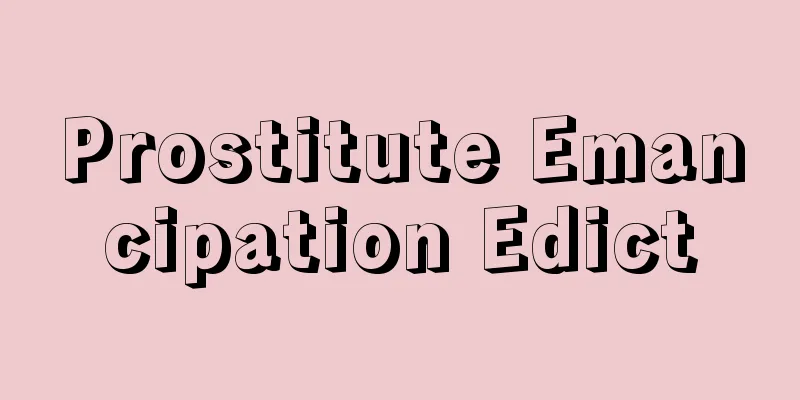Prostitute Emancipation Edict

|
This is the common name for the Meiji government's prohibition of human trafficking of geisha, prostitutes, and servants, restrictions on indentured servitude, and declaration of invalidity of advance loans. It was issued as Dajokan Tashi No. 295 and Ministry of Justice Tashi No. 22 on October 2 and 9, 1872 (Meiji 5). In the Maria Luz incident in July of the same year, the Meiji government attempted to return Qing coolies who had been nearly abducted by Peru to their home country. During the trial, the Peruvian side presented the prostitutes' indenture papers, and the government issued these proclamations as a last resort. The proclamations stated that "prostitutes and geisha have no personal rights and are the same as cattle and horses, and cattle and horses cannot be forced to repay their debts," and so they were also called the "Order to Unbind Cattle and Horses." Because the ordinance did not recognize the basic human rights of women or provide for rehabilitation measures after emancipation, it became meaningless with the launch of the rented house system (in which rooms in brothels were rented out to prostitutes for their business) in the following year, including Tokyo Prefectural Ordinance No. 145, but it also served as the fuse for the abolition of prostitution movements that began in various places thereafter. [Takizawa Tamio] "Compilation of Documents on Women's Issues in Japan, Vol. 1, Human Rights" edited by Fusae Ichikawa (1978, Domesu Publishing) [References] | |Source: Shogakukan Encyclopedia Nipponica About Encyclopedia Nipponica Information | Legend |
|
明治政府による芸妓・娼妓・奉公人の人身売買の禁止、年季奉公の制限と前借金の無効宣言の通称。1872年(明治5)10月2日と9日に太政官達(だじょうかんたっし)第295号と司法省達第22号として布告された。同年7月のマリア・ルーズ号事件で、明治政府は、ペルーに拉致(らち)されかけた清(しん)国人苦力(クーリー)の本国返還を計った。その裁判中にペルー側から遊女の年季証文を突きつけられた政府は、窮余の策として、これらの布告を出した。布告では「娼妓芸妓は人身の権利がなく牛馬と同じで、牛馬に借金返済は迫れない」としたので、「牛馬解きほどき令」ともいわれた。同令は女性の基本的人権への認識や解放後の更生対策を伴わなかったため、翌年の東京府令第145号をはじめとする貸座敷(娼妓の営業に妓楼の座敷を貸した)制度の発足で有名無実化したが、この後各地で始まる廃娼運動の導火線ともなっていった。 [滝澤民夫] 『市川房枝編『日本婦人問題資料集成 第1巻 人権』(1978・ドメス出版)』 [参照項目] | |出典 小学館 日本大百科全書(ニッポニカ)日本大百科全書(ニッポニカ)について 情報 | 凡例 |
Recommend
sira (English spelling)
… [The Birth of the Historical Narrative Akhbar] ...
Al-Manṣūrah
The capital of the Dakahlia Governorate in norther...
Bow and harp
A type of koto. See the entry for "bow" ...
Altun [Mountains] - Altun
In Chinese characters, it is called Alkin Mountain...
Orthovanadic acid - Orthovanajinsan
…These general formulas V 2 O 5 ・ n H 2 O are wri...
Yale University
Located in New Haven, Connecticut, it is the third...
Järnefelt, E. (English spelling) JarnefeltE
…Gallen Carrera, a leading figure in nationalist ...
Persimmon [Village] - Kakinoki
A town in Kanoashi County in the southwest of Shim...
Storm petrel - Storm petrel
A general term for birds in the Hydrobatidae famil...
Shadow Standing on Mt. Fuji - Fujini Tatsukage
A full-length novel by Shirai Kyoji. It was seria...
《Fable》 - Gwah
…The Japanese word fable is probably a translatio...
Geococcyx velox (English spelling) Geococcyxvelox
… [Nobuo Takeshita]. … *Some of the terminology t...
Maxillaria porphyrostele (English spelling) Maxillariaporphyrostele
…[Koichi Ejiri]. … *Some of the terminology that ...
Shibata [town] - Shibata
A town in Shibata County in southern Miyagi Prefec...
Inryo
…Based on ancient Chinese music theory, half of t...








![Seleucus [I] - Seleucus](/upload/images/67cc076991e07.webp)
